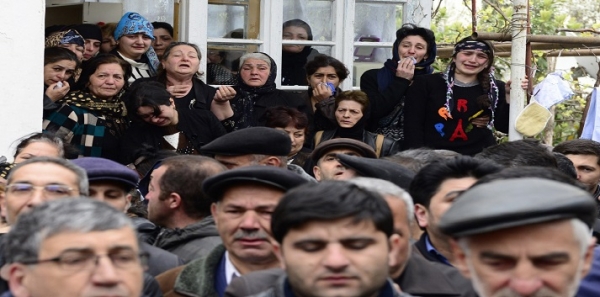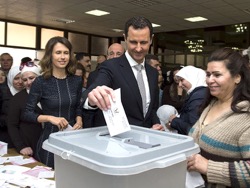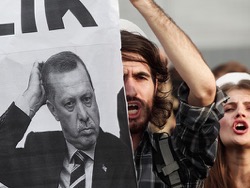 Vladimir Putin is the new best friend of Turkey?
Vladimir Putin is the new best friend of Turkey?
Editor of The National Interest Nikolas K. Gvosdev suggests that Vladimir Putin may use the abortive coup in Turkey, to cause the Recep Tayyip Erdogan distrust of the West and to sway him to their side
In the aftermath of the failed military coup against President Recep Tayyip Erdogan has one unexpected (and undesirable from the point of view of the States): it can contribute to the further reconciliation of the Turkish leader and President of Russia Vladimir Putin.
Between the two leaders there was not only a solid personal relationship based on shared values: both do not accept the idea that Western values are universal model for all societies. The two presidents oversaw the process of transforming Turkish-Russian relations — is deeply hostile to at the end of the Cold war to the Mature strategic partnership between the easternmost member of NATO and the Kremlin. After beginning of the Ukrainian crisis Turkey is not only refrained from joining the Western sanctions against Russia, but even offered an alternative to the deceased not having been born the project “South stream” gas pipeline “Turkish stream”, which, if built, will make Russia an independent Ukraine as a transit country for Russian energy supply in Central and southern Europe.
These warm and friendly communication, confirmed to the world in the fall of 2015 G20 summit in Antalya, suddenly ended in a complete stupor, when the Turkish fighter jet shot down a Russian bomber, for a short time, flew into Turkish airspace during a mission in Syria in support of President Bashar al-Assad.
Putin’s response was instant and immediate. It has imposed sanctions against Turkey, Russia has moved to large-scale strengthening its base in Syria. Putin with excessive clarity made it clear that he believes the actions of Erdogan’s betrayal of the highest order.
Western strategists are worried about the rapprochement between Russia and Turkey, breathed a sigh of relief: the conflict with Russia again has thrown Turkey into the arms of the West. Erdogan, in turn, demanded evidence of Turkey’s support of NATO allies. Soon followed by an agreement with the European Union that Turkey will control migration flows to Europe, and in return receive a number of concessions, including a return to the agenda of the question of the accession of Turkey to the EU.
All this seemed to signal the return of Turkey to its traditional role as a Bastion of the West in the Eastern Mediterranean, not only opposing chaos that is spreading from the Middle East, but also restraining Russian expansion.
Of course, the incident with the Russian bombers were only a symptom of a larger problem that has disturbed the Russian-Turkish relations, and it is associated with the Syrian crisis. When the uprising began against Bashar al-Assad, Turkey has supported the Sunni opposition, hoping that the Assad regime associated with Iran, will be replaced by a more friendly government of Turkey. Russian support of the Syrian regime has always been a problem, but when Moscow decided to move from simple resupply Assad to the real ground intervention to save the regime from collapse (in the summer of 2015 seemed that after four years of civil war, Assad is backed into a corner), Turkey considered the actions of the Kremlin is openly hostile to its own interests in Syria.  The funeral of the deceased in Syria the pilot of the su-24 bomber Oleg Peshkov in Lipetsk
The funeral of the deceased in Syria the pilot of the su-24 bomber Oleg Peshkov in Lipetsk
But in late spring, Erdogan began to change course. He finally brought a belated apology for the downed Russian plane such public statements, Moscow has demanded as payment for the beginning of normalization of relations. Moreover, the Turks, looking at the map, could come to the conclusion that Russian intervention has strengthened the Assad regime, and he is not so risk of falling, but the ongoing civil war in Syria and, in particular, that the US need for reliable regional allies in the fight against “Islamic state”, it strengthens the position of the Syrian Kurds and their political and military organization, closely associated with the Kurdistan workers party in Turkey. In Turkey the continuing stalemate makes the emergence of a new Kurdish state formation, Syrian Kurdistan (in addition to Iraqi Kurdistan), more than likely. The Kurds help US not only: Moscow gave to understand that changes course, and also began to look for the approach to the Kurds, allowing them a political movement in the beginning of this year to open the office in Moscow.
As a result of political settlement in which Assad remains in power, maybe for Turkey as a lesser evil than the situation when Ankara will be in the role of midwife at the birth of the state of Syrian Kurds.
The outbreak of fighting in Nagorno-Karabakh this year — is also a headache for Turkey. She does not seek conflict with its ally ally of Russia in the Caucasus, and the continuation of the fighting can damage critically important for Turkey’s project in which she made a major investment — the TRANS-Anatolian pipeline, which will deliver Caspian gas to European markets bypassing the Russian pipeline system. Despite the fact that the project “Turkish stream” has apparently cancelled the “southern energy corridor vital for Erdogan, hoping to turn Turkey into an energy transit country, essential for Europe and for Israel, which develops its own large gas resources (the latter is the basis for the improvement of Turkish-Israeli relations, which have recently also died).  The funeral of a local resident, who died as a result of Armenian-Azerbaijani armed conflict on the contact line of Azerbaijan and Nagorno-Karabakh
The funeral of a local resident, who died as a result of Armenian-Azerbaijani armed conflict on the contact line of Azerbaijan and Nagorno-Karabakh
Putin and Erdogan have begun to lead the relationship in order. The foreign Ministers of the two countries discussed how to bring to life the planned strategic cooperation. And in that moment there was a coup attempt.
The United States is constantly deny that in any way encouraged or supported the rebellion. But it doesn’t matter: Putin easily could play into suspicions of Erdogan, whom it seems that the Obama administration wanted his ouster. This coincides with the picture of the world, which says Putin: US preach partnership with other States, and supposedly themselves at the first opportunity to overthrow their governments is problematic (as he interpreted unsuccessful “white revolution” that occurred in 2011, when he decided to return to the presidency; he was convinced that the signal for action was given by the Secretary of state, Hillary Clinton).
It is easy to imagine Putin, speaking on Sunday with Erdogan on the phone, could likewise interpret events and to find at the other end of the phone an appreciative audience. There is no doubt that such a signal will be or already has been brought up to President of Azerbaijan Ilham Aliyev, who in a few weeks will have a trilateral meeting with Putin and Iranian President Hassan Rouhani.
To be attended Erdogan’s coup attempt to compromise with Putin on the future of Syria? Return to life the project “Turkish stream”, and together with it Russia’s hopes to finally get rid of transit through Ukraine? In the coming weeks we will see.
Original article: Nikolas K. Gvozdev, “Putin can become the new friend of Turkey after the failed coup”, The National Interest








